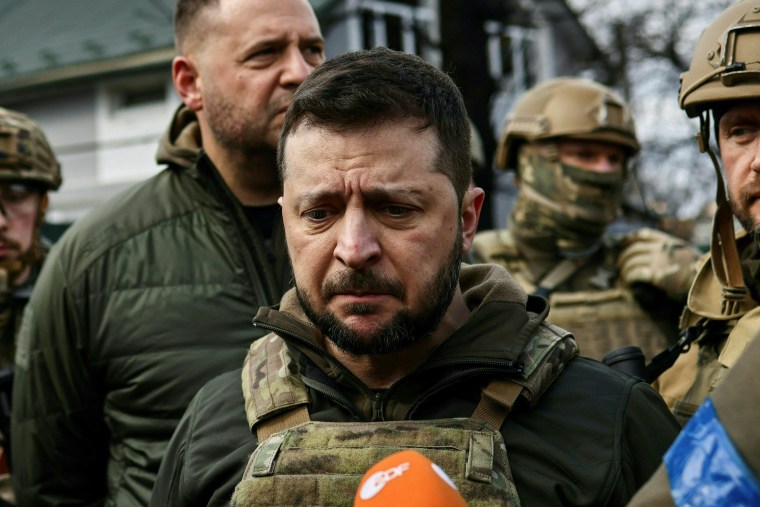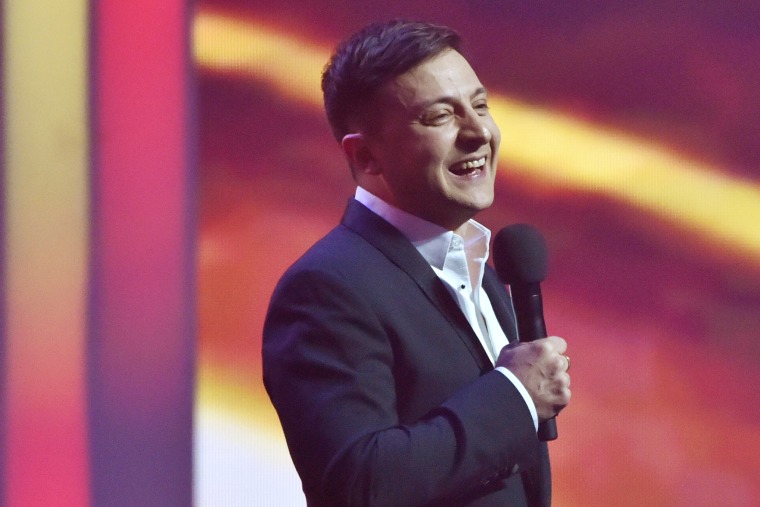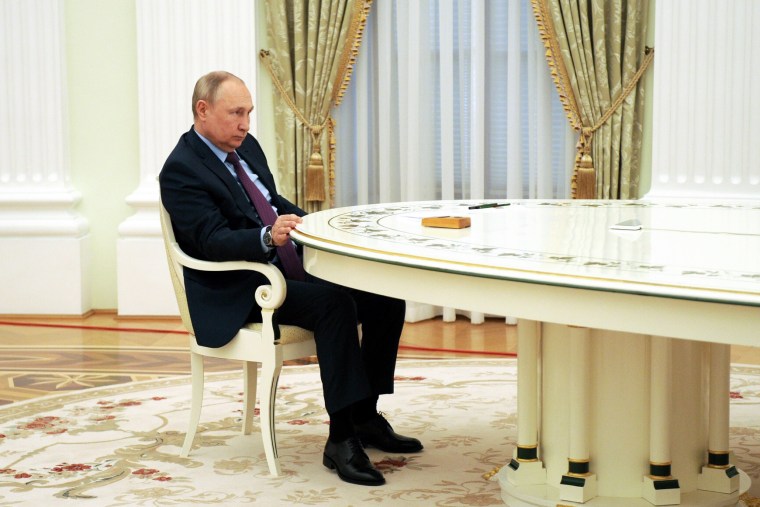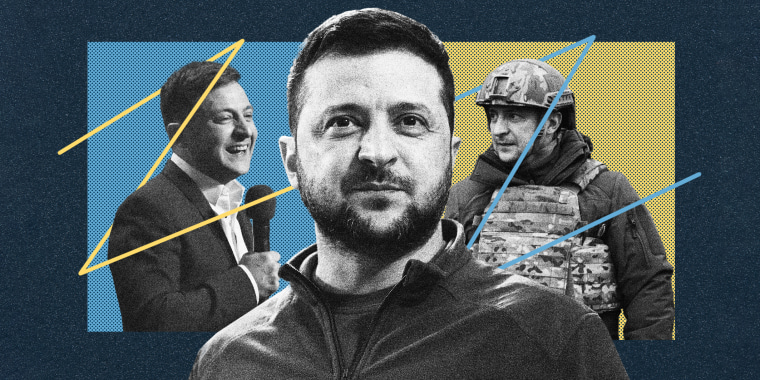LONDON — He’s been described as heroic, inspirational and a “champion” for the democratic world.
Three months ago, Ukrainian President Volodomyr Zelenskyy was an increasingly unpopular leader of one of Europe’s poorest countries. Today, he’s become a symbol of the battle between democracy and authoritarianism — one who continues to push the world to keep its attention on a war that has already killed thousands and has no easy end in sight.
“The reason we are back is because of you, because of the extraordinary courage, leadership and success that you have had in pushing back this horrific Russian aggression,” Secretary of State Antony Blinken said in a meeting with Zelenskyy and other Ukrainian leaders last month.
Blinken, sitting directly across the table from Zelenskyy, drew a stark contrast: the top U.S. diplomat, clean shaven, dressed in a dark blazer and a white button-down shirt; Zelenskyy in dark-green fatigues and sporting a thick beard. Though it’s a new look for the Ukrainian leader, it’s one that has become a global image of resistance and resilience.
Surrounded by a digitally savvy team of advisers, Zelenskyy, 44, has been recording daily video updates, usually subbed in English, across major social platforms, in which he speaks to those at home and abroad about the country’s victories and challenges, often greeting his compatriots as “the bravest people of the bravest nation.” As a rule, he looks exhausted, but determined, echoing the state of his nation.
That was the case Monday, as Zelenskyy spoke straight to the camera while striding the empty streets of Kyiv in a recorded address on Victory Day.
Those videos have resonated around the world, putting a face to the Ukrainian plight. Politicians of all stripes have been clamoring for his company, some hoping to raise their own profiles by associating with the man of the day. British Prime Minister Boris Johnson visited Zelenskyy in Kyiv last month, calling him “the roar” of the Ukrainian lion, bravely taking on Russia.
“One cannot but recognize your extraordinary leadership that is inspiring Ukrainians, but inspiring people around the world about how one fights for what is right, fights for one’s country, fights for one’s future,” Canadian Prime Minister Justin Trudeau told Zelenskyy during his own surprise visit to the Ukrainian capital this past weekend.
In the early days of the war, the Canadian leader said Zelenskyy was a “champion” for all democracies around the world.
Trudeau’s comments hint at the broader battle that Zelenskyy now represents.
At the outset of the war, as it became apparent Ukrainians were resisting the Russian military might against all odds, Zelenskyy became a hero not only for Ukrainians, but also for many in the West, who saw him as a fighter for freedom and the beleaguered liberal order.
“Many people in the West see that Ukrainians are not only defending their country, but democratic values and ideals as well,” said Volodymyr Fesenko, a political analyst and the head of the Ukrainian think tank Penta. “Zelenskyy has become a symbol of that fight.”
As Russian bombs rained on Ukrainian cities, few could have imagined that the comedian-turned-president would morph into a war leader, becoming a global phenomenon and one of Ukraine’s most potent weapons against Russia.
“The war revealed him as a courageous person,” Fesenko said. “Not just as president, but as a human being. That has impressed not just Ukrainians, but people around the world as well.”
Experts say one of the defining moments of Zekenskyy’s war-time leadership, if not of his entire political career, was his decision to remain in Kyiv as the Russian forces closed in on the Ukrainian capital in the early hours of the invasion.
At the time, he was assessed to be a primary target should the Russian army storm Kyiv.

“There was a fear that he may run away. People didn’t know how he would react,” said Orysia Lutsevych, a research fellow at the London think tank Chatham House.
But the Ukrainian president did not run. Instead, in a hand-held Instagram video, standing next to his advisers and the prime minister, he boldly declared that he was staying in the capital.
“The citizens are here and we are all here,” Zelenskyy said in the now viral video.
He quickly ditched formal suits for military fatigues and has taken every opportunity to address any audience he can get — from Congress and the Grammy Awards in the U.S. to almost every European parliament. His addresses are often met with standing ovations.
His time in office prior to the war was marked by criticism about his inability to stamp out corruption and end the war with pro-Russian separatists in Ukraine’s east. Many considered him a populist, Fesenko said.
But the war has given Ukrainians and the world a different view on Zelenskyy.
“People see a real human being in him, who is living this war and fighting,” Fesenko said.
Zelenskyy’s background in production and entertainment has come in handy during the war. He knows how to deliver a line and can carry himself in front of the camera, which has helped him to adapt to the new reality of war “almost like it’s a new script for him,” Lutsevych said.
In a case of life imitating art, he played a Ukrainian president in a popular TV show only to become a real one in a landslide victory in 2019. Before that, he had a successful career as a comedian and actor, despite being educated as a lawyer.
He won his country’s version of "Dancing With the Stars" in 2006 and was the voice of Paddington Bear in the Ukrainian version. There are still clips of him on YouTube, provocatively dancing in high heels.

Those pieces of trivia alone have helped propel Zelenskyy’s global popularity to new heights since the start of the Russian invasion.
Zelenskyy’s face and name have graced the covers of international magazines and newspapers. His wife, Olena Zelenska, has been interviewed by Vogue.
Streets around the world have been unofficially renamed after him, online stores sell his signature olive-colored military shirt, women swoon over him on social media, and there is even a song dedicated to his rise as the war leader.
In the U.S., a poll conducted in March by the Pew Research Center showed that more than 70 percent of Americans have a lot or some confidence in Zelenskyy’s handling of international affairs, higher than any other international leader asked about in the survey.
“Finally, we have a president that everybody loves and his approval rating is sky-high,” American comedian Bill Maher quipped. “It’s the president of Ukraine, but still.”
That appeal contrasts sharply with Russian President Vladimir Putin.
“When you look at the differences between these two political brands: One guy is 69, the other is 44. He is good looking, which is not a small thing, articulate and looks like he’s physically in good shape,” Bruce I. Newman, a professor of marketing at Chicago’s DePaul University, said referring to Zelenskyy. “He has all the physical, mental and charismatic components that make him look so much stronger than Putin.”
While Zelenskyy uses social media and addresses parliamentarians around the world via Skype, Putin has spoken publicly only a handful of times since the invasion — his messages, usually dry and often recorded, carried by the state media. Even Putin's much anticipated speech Monday was relatively short and characteristically devoid of emotion.
Visually, there is a striking contrast as well, Newman said. While Zelenskyy appears in his military fatigues, Putin comes across as a “pinstriped executive-looking-like leader” hiding behind a very long table.

By speaking Russian in his video messages to directly address the Russian public (Zelenskyy is a Russian speaker), the Ukrainian president has also regularly defied Kremlin’s propaganda portraying him as the anti-Russian leader of a nation consumed by Nazi ideology.
Zelenskyy is Jewish and has said that his great-grandparents were killed when their village was set on fire by the Nazis during World War II.
But ultimately, it’s his ability to come across as just “another Ukrainian” on the front lines that has been winning him praise at home and abroad, Fesenko said.
“He is not a manager or an autocratic leader who decides everything,” he added. “His military experts make military decisions and Ukrainian diplomacy plays an active role, but his job is to unite all that and inspire with his example, to show that he is fighting to liberate his country alongside everybody else.”

